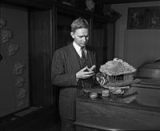Awards
- National Academies - 1947
- American Association for the Advancement of Science

Georg K. Neumann, associate professor of anthropology, died on April 13, 1971. He was born in Hamburg, Germany, in 1907, but because his mother was a teacher of French, he spoke only French until he started school at age 6, after which he rapidly learned German. After coming to the United States in 1920, he soon learned English and became trilingual in these languages. He obtained a B.Ph. degree in 1930, an M.A. in 1936, and a Ph.D. in 1950, all from the University of Chicago. He worked as the assistant director of a WPA archeological excavation in 1935-37 in Tennessee. From 1937-42 he was research associate in physical anthropology in the Museum of Anthropology at the University of Michigan under the sponsorship of Eli Lilly. In this position, he concentrated on the pre-history of Indians in Indiana derived from archeological materials, principally skeletal remains. When he came to Indiana University in 1942 his osteological interests led him to choose the zoology department, where he was associated with Alfred Kinsey, Tracy Sonneborn, and Herman Muller, among others. When the anthropology department was founded in 1946, he joined C. F. Voegelin and Glenn A. Black to form the three-man department. Beginning in 1946, Neumann taught a course in introductory physical anthropology and archeology. This course eventually grew to 450 students and, with his other courses, his total number of students almost equaled that of the other six anthropologists combined. In the 1950's he wrote two introductory correspondence courses which he taught for more than 20 years. He was also the unofficial director of the small anthropological museum on the second floor of the old library building until the Indiana University Museum (later renamed Mathers Museum of World Cultures) opened in 1963. From 1942 to 1963, he collected, mostly by loans from other institutions for whom he had been employed for research, the third largest collection of Indian skeletons in the nation and brought them to Indiana University for study by graduate students. He received two sizeable grants from the National Science Foundation in the summers of 1962 and 1964 to direct programs in anthropology for high school teachers. At times he helped local and state police solve crimes by determining the age, sex and cause of death of deceased persons, often years after death.